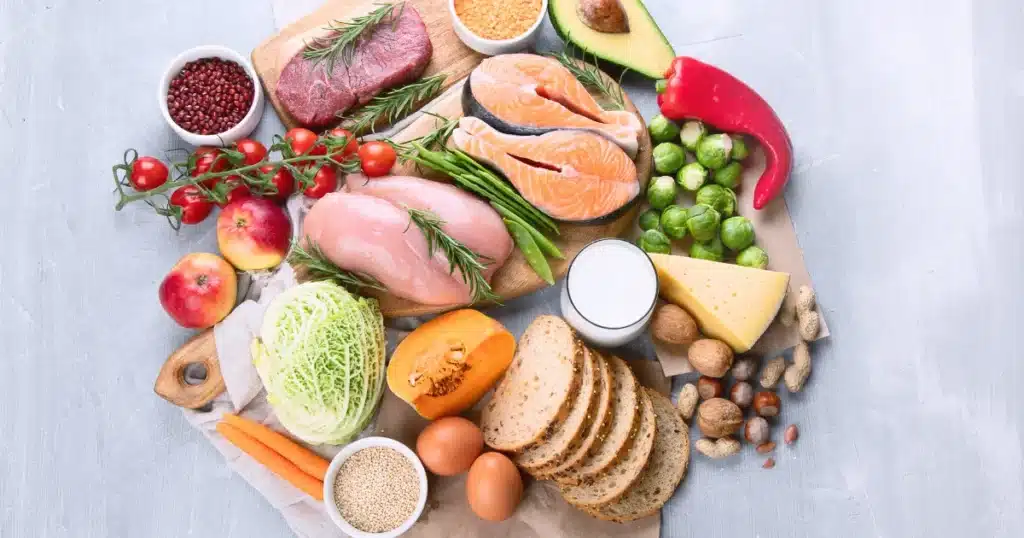Level Up Your Nutrition Game With Our Freebies
Alex
I provide nutrition coaching for endurance athletes to improve performance and body composition through a simple and flexible eating style.
Hi, I'm
ATHLETE EATING GUIDE →
LEARN MORE →
ATHLETE GROCERY SHOPPING GUIDE →
10-DAY PROTEIN-PACKED SAMPLE MEAL PLAN
READY TO FUEL?
incredible value!
The fueling guide bundle serves as your one-stop-shop for strategies to fueling before, during and after your workouts.
You have been given the green light from your medical provider to start exercising regularly postpartum, which comes with much anticipation. While the return of fitness after birthing a human can seem daunting, for many mother runners it is also a much-needed escape from the new realities of everyday life as a parent. As you venture back to training, postpartum athlete nutrition needs to be a top priority to ensure that you are fueling you, your baby, and those much-anticipated miles ahead.
BONUS – Grab my best Lactation Cookies recipe! They are a must-have after having a baby!
Postpartum Athlete Nutrition: Prioritize As a New Mom

Quick story – I had a dietitian friend, a new mom, call me for tips to increase milk production as she was back to work, breast pumping during the day and milk supply was dropping. I immediately asked her, “Are you exercising?” She mentioned that she had returned to her cycling classes.
I pulled up my calculator and started estimating her calorie needs. Based on her body size, activity level and current milk production she needed about 2,800 calories per day to meet all her body’s demands. “Oh, yeah, I’m not eating anywhere near that much. I was really hoping to lose some of the baby weight too,” she reported. It definitely can feel like a dilemma when you want to be able to feed your baby, do the exercise that you love and try to get back to a pre-pregnancy weight. And, truthfully, you may not be able to do it all at the same time and that’s ok!
While many women want to race (quite literally) back to their pre-pregnancy weight, it is important to consider your top priorities as a new mother and athlete. Exclusively breastfeeding mothers may see a weight loss of 1-2 pounds per month, on average. However, it is important to note that for those struggling to lose the pregnancy pounds, breastfeeding is not the answer. Instead, the focus should be on a healthy and nutrient-rich diet and exercise routine that isn’t overwhelming. You will need to consider and weigh your priorities, otherwise, there is a large risk of underfueling your body for the miles ahead and that can put a lot of additional stress on the body. Even more troublesome, there is also an increased risk of dwindling your breast milk production.
Nutrition for the Breastfeeding (or Breast Pumping) Athlete
Plain and simple, your calorie needs increase quite dramatically as you ramp up your training load while breastfeeding. Each ounce of breast milk has about 22 calories. The medical community recommends that for most infants below 6 months, this is at least 400-500 calories per day that a new mom is burning in addition to her daily activities. If you are getting back to exercising and endurance training, you will be burning additional calories as well. Many breastfeeding or breast-pumping athletes need at least 2,500 calories per day to maintain enough energy for milk production and to support their return to fitness.

Maximizing Postpartum Athlete Nutrition: Macro and Micronutrients
Carbohydrates
Carbohydrates are top-tier fuel when it comes to filling your nutrition tank because carbohydrates are the body’s favorite, most efficient, source of energy. When you consume carbohydrates, your body breaks the food into glucose (sugar) and either use it for activity (i.e. a run, swim or ride) or converts it into glycogen to be used later. Typically, most athletes require at least 55% of their calorie intake from carbohydrates though this can vary based on factors such as duration and intensity of the workout. If you are low in carbohydrate intake, there is a good chance your breast milk production will suffer so it is important to make sure you regularly include carbs with most meals and snacks. You want to aim for at least 210g of carbohydrates per day though depending on your training volume, there is a very good chance you will need more.
Simple carbohydrates
Simple carbs digest rapidly and include raw sugar, energy gels, sports drinks, fruit and juice, candy, and foods with added sugars. Foods that are high in simple carbohydrates are low in fiber and break down quickly to be used as energy. These foods are effective while training to provide quick bursts of energy. During your training, it is imperative to take in enough simple carbohydrates so that you do not run out of fuel, and typically 60-90g of simple, easy-to-digest carbohydrates per hour is the target for most endurance athletes, even while breastfeeding. Caution on the energy gels and sports drinks with excessive caffeine.
Complex carbohydrates
Complex carbs take longer to digest and are found in higher fiber, nutrient-dense foods such as whole grains, legumes, starchy vegetables such as sweet potatoes, among others. These foods are excellent to include throughout the day in meals and snacks to boost your vitamin and mineral intake and help keep you feeling satisfied and baby nourished. Furthermore, these foods are rich in vitamins and minerals which are important for nutrient-dense breast milk.
Protein
Most breastfeeding athletes need at least 1.7-1.9g of protein per kilogram of body weight per day, which should be spaced throughout the day. Lean protein-rich food sources to include regularly include: poultry, fish, beef, eggs, Greek yogurt and cottage cheese, tofu, tempeh, seitan, edamame, and legumes. If you find yourself constantly short on meeting your protein needs, consider topping your toast with an extra egg, sipping on a protein-rich smoothie between meals, or snacking on a low-sugar protein bar. Be sure to reference our high-protein breakfast and lunch posts for more ideas!
Healthy Fats
Fat is your baby’s main source of energy and is vital for brain development. ~20-30% of your diet should be composed of healthy fat sources including olive oil, nuts and seeds, olives, avocado, or 8-12 ounces of lower-mercury fish per week. Flaxseed, chia seed and walnuts are extremely rich sources of omega 3 fatty acids (which contain EPA and DHA). Research shows that regular consumption can help reduce inflammation from training demands and also support your baby’s brain development.
Fruits and vegetables
Aim for at least 5 servings of fruits and vegetables per day. Focus on a wide range of produce to get in a variety of micronutrients. Top your Greek yogurt with berries, add spinach and peppers to your eggs, or enjoy sliced apples with almond butter to sneak in more nutrients. Fruits and vegetables also have high water content and are hydrating for adequate milk production.

Vitamin and mineral needs for breastfeeding
A mother’s need for iodine and choline increases during lactation. The Dietary Guidelines for Americans recommend that lactating women consume 290 mcg of iodine and 550 mg of choline daily throughout the first year postpartum. Iodine is found in dairy products, eggs, seafood, or in iodized table salt. Choline can be found in dairy and protein food groups, such as eggs, meats, some seafood, beans, peas, and lentils. Be sure to aim for 1,300mg of calcium per day while regularly including food sources such as Greek yogurt, cottage cheese, milk or plant-based milk alternatives, legumes, almonds, and leafy greens.
You may want to consider continued use of a prenatal vitamin if you are struggling with balanced nutrition postpartum. Though be sure to discuss this with your medical care provider. With your return to training, you may need additional iron supplementation as well.
Postpartum Athlete Nutrition: Hydration for New Moms
The recommendation is to consume at least 16 cups of hydrating fluids (>1 gallon) daily to support adequate milk production. Fortunately, you can count any non-alcoholic, non-caffeinated beverage towards this fluid goal. Include water, carbonated water, milk and milk alternatives, smoothies, fresh fruit juice, and decaffeinated herbal teas regularly. Protein drinks are hydrating as well though opt for a protein powder that is third-party tested and free of unnecessary ingredients. I personally love Thorne’s Whey Protein Isolate (affiliate link for 15% off).
Caffeine passes from the mother to the infant in small amounts through breast milk. Usually, this does not adversely affect the infant when the mother consumes moderate amounts (about 300 milligrams or less per day, which is about 2 to 3 cups of coffee). Also, excessive caffeine intake can lead to dehydration so it is important to moderate your intake.
Portable and convenient snacks to keep on hand to fuel those miles and you and the baby! Many times, you will need to rely on easy and quick nutrient-rich go-to snacks and a few of our favorites include:
- String cheese, jerky and whole grain crackers
- Salmon packet with pita chips. Be sure to avoid high-mercury fish including shark, swordfish, tilefish and king mackerel
- Adult pb&j with an extra scoop of ricotta cheese for a protein and calcium boost
- A few no-bake protein energy bites with a side of fruit. Add brewers yeast for galactagogue-enhancing benefits
- Greek yogurt parfait with banana slices and oat-based granola
- Carrots and sliced apples drizzled with peanut butter
- High-protein trail mix
Be sure to reference our high-protein snack post for more easy and convenient ideas!
Nutrition Strategies to Boost Your Milk Supply
There is no scientific evidence that proves any single food item ramps up lactation. But several strategies that may boost milk production include:
- Optimize nutrient-rich foods, particularly before and after your workouts
- Maintain adequate energy intake while aiming for 3 meals and 2-3 snacks daily. If you have increased hunger, a midnight snack snack may be good to include that will benefit you and the baby!
- Focus on fluids while regularly including hydrating beverages and foods. At minimum, aim for 16 cups of fluids daily
- Include galactagogue-rich foods. There is increasing evidence to support foods such as brewers yeast, flaxseed, and oats may boost breastmilk supply and can be a tasty addition to an easy batch of lactation cookies (see recipe here). There is anecdotal evidence that herbal remedies such as fenugreek, fennel, and garlic can also boost milk supply, but it is important to discuss any supplementation with your medical provider prior to consuming.
Watch Episode 5 of the Endurance Eats Series – Prenatal and Postpartum Nutrition Discussion
Tune in as Alex and her female athlete dietitian team discuss prenatal and postpartum nutrition for the active moms! And, make sure to tap that subscribe button to catch future videos!
IN THIS EPISODE:
(0:00) – Welcome
(2:35) – Nutrition considerations for female athletes during pregnancy
(19:45) – Nutrition recommendations for after pregnancy when wanting to return to fitness and training
(28:30) – Rapid fire questions on dietitians Alex and Mary’s experiences as pregnant new mom athletes
Postpartum Athlete Nutrition: You don’t have to go about this alone
If you are returning to endurance training and are a breastfeeding mother, we highly recommend reaching out so we can help you optimize your nutrition for postpartum training! Be sure to apply today!
Alex
I provide nutrition coaching for endurance athletes to improve performance and body composition through a simple and flexible eating style.
Hi, I'm
LEARN MORE →
take the quiz!
Let's discover your Endurance Nutrition IQ
How well do you know your fueling? Answer these questions and let's see where your endurance nutrition knowledge is at!
Take the quiz
level up your nutrition game with these freebies
free downloadS
Protein-Packed 10-Day Sample Meal Plan
Athlete Eating Guide
Athlete Grocery Shopping Guide
1
2
3
Inspiration to fit 120 grams of protein into your day
Planning what goes on your plate
Putting the right foods in your grocery cart
